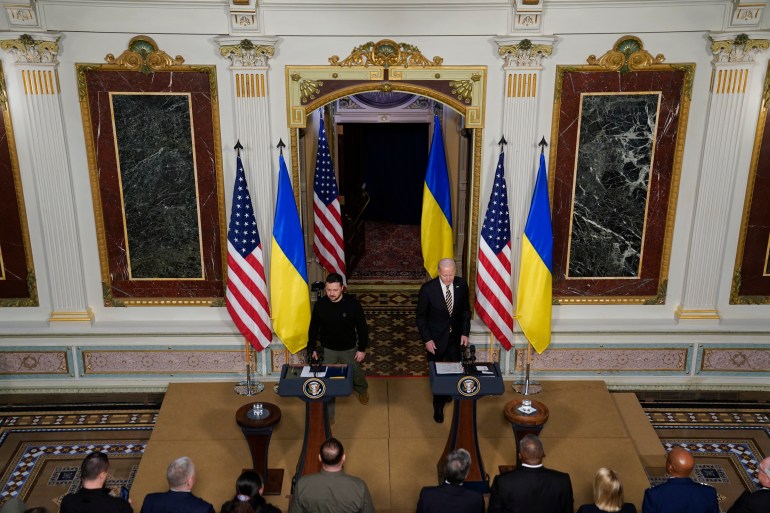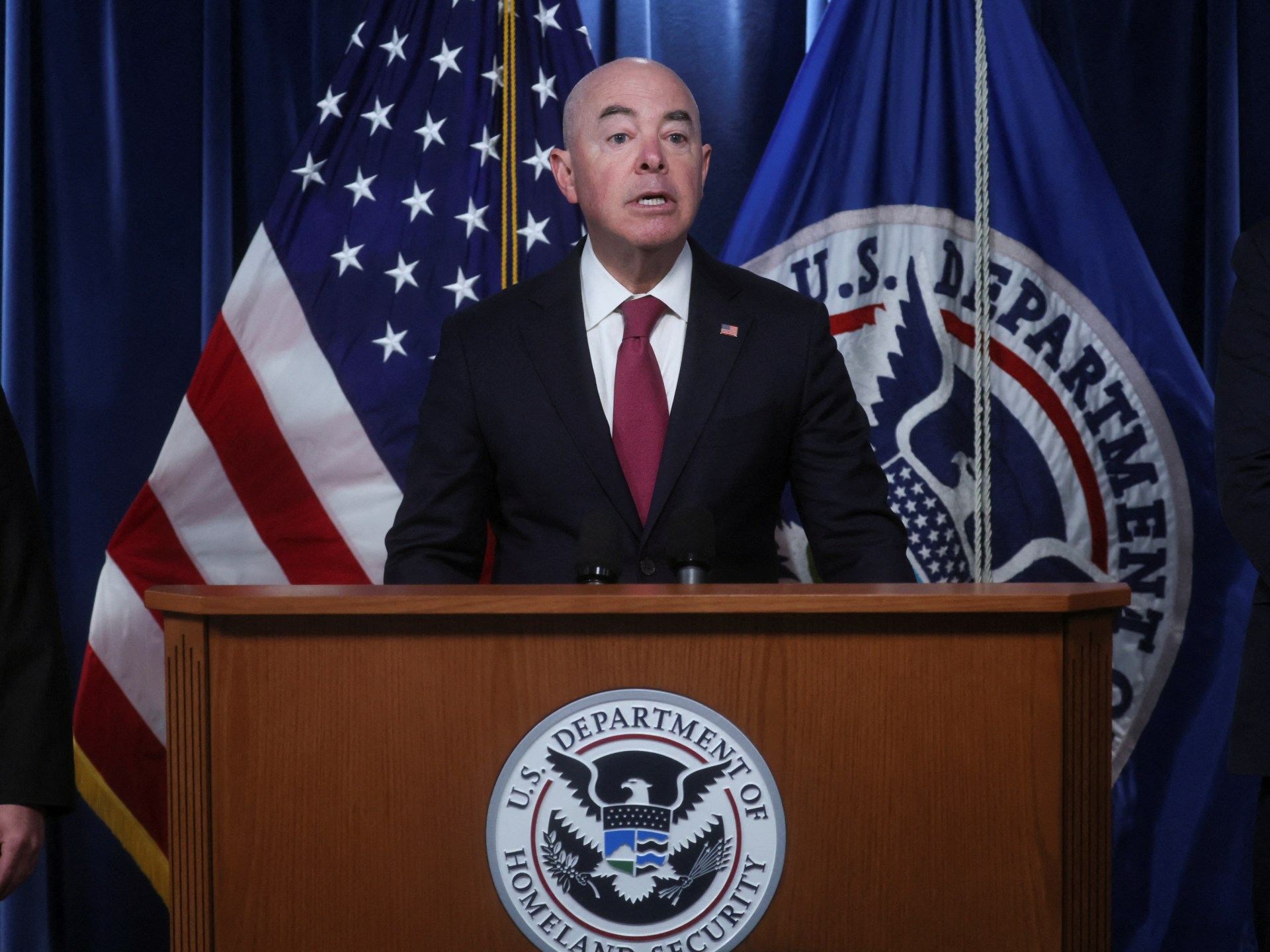Washington, DC – More than a hundred staff members from the United States Department of Homeland Security (DHS) have signed an open letter to Secretary Alejandro Mayorkas denouncing the department’s handling of the war in Gaza.
The letter, exclusively obtained by Al Jazeera, expresses frustration with the “palpable, glaring absence in the Department’s messaging” of “recognition, support, and mourning” for the more than 18,000 Palestinians killed in Gaza since the start of the war on October 7.
“The grave humanitarian crisis in Gaza and the conditions in the West Bank are circumstances that the Department would generally respond to in various ways,” the letter, dated November 22, said.
“Yet DHS leadership has seemingly turned a blind eye to the bombing of refugee camps, hospitals, ambulances, and civilians.”
The letter’s signatories include 139 staff members from DHS and the agencies it manages, like Customs and Border Protection (CBP), the Federal Emergency Management Agency (FEMA), Immigration and Customs Enforcement (ICE) and US Citizenship and Immigration Services (USCIS).
But some staff members “elected to sign this letter anonymously” for fear of backlash, the document explained. It called for DHS to “provide a fair and balanced representation of the situation, and allow for respectful expression without the fear of professional repercussions”.
DHS did not respond to Al Jazeera’s request for comment by the time of publication.
The letter is the latest indication of fractures within the administration of President Joe Biden, who has faced internal criticism for his government’s stance on the Gaza war.
Last month, more than 500 officials from 40 government agencies issued an anonymous letter pushing Biden to call for an immediate ceasefire in Gaza. Another letter, signed by 1,000 employees from the US Agency for International Development (USAID), expressed a similar appeal.
But Biden has been reluctant to criticise Israel’s ongoing military offensive in Gaza, instead pledging his “rock solid and unwavering” support for the longtime US ally.
In an internal message on November 2, Mayorkas echoed Biden’s stance. He denounced the “horrific terrorist attacks in Israel on October 7”, perpetrated by the Palestinian group Hamas, but made no mention of the humanitarian crisis in Gaza.
“The impacts [of October 7] continue to sweep through Jewish, Arab American, Muslim and other communities everywhere,” Mayorkas wrote.
“I am heartened knowing that our Department is on the front lines of protecting our communities from antisemitism, Islamophobia, and other forms of bigotry and hate.”
But two DHS staff members who spoke to Al Jazeera on the condition of anonymity felt that department leadership should be going further to address the mounting death toll in Gaza, where civilians remain under Israeli siege.
United Nations experts have already warned of a “grave risk of genocide” in the territory, as supplies run low and bombs continue to fall.
“I’ve been very dedicated to the federal government,” one anonymous DHS official said. “I’ve served in different capacities. I very much believed in our mission.
“And then, after October 7, I feel like there has just been a drastic shift in this expectation of what we’re supposed to do when there’s a humanitarian crisis and what we’re actually doing when there’s politics involved, and that has a very, very scary, chilling impact.”
The staff’s open letter calls for DHS to take actions in Gaza “commensurate with past responses to humanitarian tragedies”, including through the creation of a humanitarian parole programme for Palestinians in the territory.
That would allow them to temporarily enter the US “based on urgent humanitarian or significant public benefit reasons”.
The letter also pushed DHS to designate residents of the Palestinian territories eligible for “temporary protected status” or TPS. That would permit Palestinians already in the US to remain in the country and qualify for employment authorisation.
Such programmes have been put in place for other conflicts, including for Ukrainians facing full-scale invasion from Russia.
Last month, 106 members of Congress — including Senator Dick Durbin and Representatives Pramila Jayapal and Jerry Nadler — even sent a letter to Biden, urging a TPS designation for the Palestinian territories.

But one of the anonymous DHS officials who spoke with Al Jazeera said that, although there has been discussion about a possible TPS designation, action seems unlikely.
“There have been a lot of serious systemic and programmatic obstacles driven purely by politics,” she said.
Part of the challenge is that the US does not recognise Palestine as a foreign state, putting its eligibility for TPS in doubt.
“We don’t recognise Palestine as a state. We don’t code them with that,” the DHS official explained. “And that’s something across Customs and Border Protection, ICE and USCIS. There have just been obstacles raised at the highest levels of those agencies.”
The official suspects she knows why. “They’re worried about their own operations in terms of removing or deporting people to Gaza and the West Bank, if they were to change these codes.”
But that inaction has levied a steep toll on employees’ mental health, according to the DHS officials Al Jazeera spoke to.
One described how colleagues with family in Gaza had received no support from DHS leadership as they tried to bring their relatives to safety.
The other, a senior staff member who has spent more than a decade working for the federal government, described having nightmares of losing his own children.
He said he wakes up “with the knowledge that we’re not actually doing all that we can to provide programmes and relief for the Palestinians”.
“It’s definitely distressing and dispiriting to feel like, for political considerations, we’re not addressing [the conflict] in the same way that we would other previous, recent humanitarian crises, for instance, like Ukraine.”
The senior official voiced dismay that Biden’s immigration policies have remained similar to that of his predecessor, former President Donald Trump.
Biden has faced pressure to limit the number of arrivals in the US, particularly as migration across the US-Mexico border spikes.
“The issue is, honestly, that the Biden administration has been really tepid about moving too far in front on immigration and is focused almost entirely on the southern border and how that impacts the administration politically. That has informed a lot of the decision-making with respect to new programmes,” the official said.
That tepidness has left many of the anonymous DHS officials feeling demoralised, questioning their sense of mission.
“We have the ability to do anything, something, and we’re just not,” one of the officials said.
Check out our Latest News and Follow us at Facebook
Original Source

